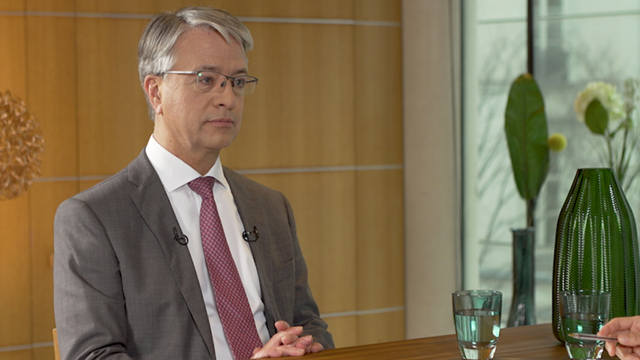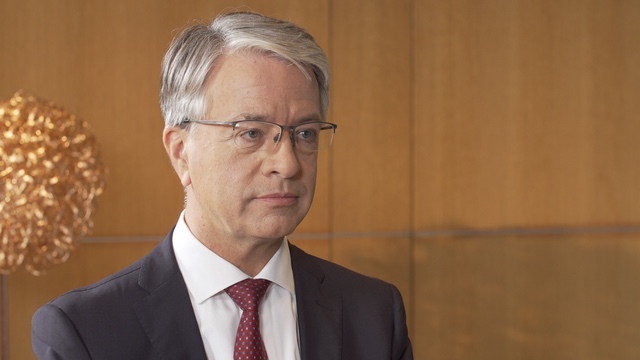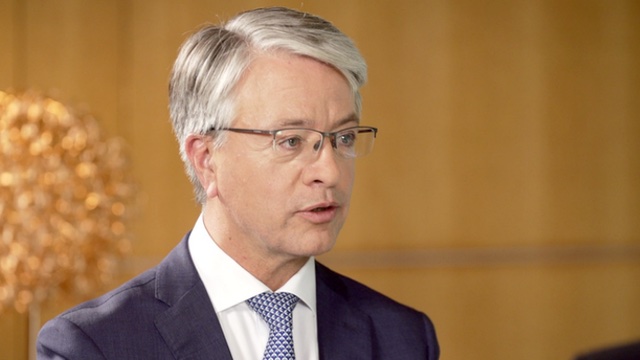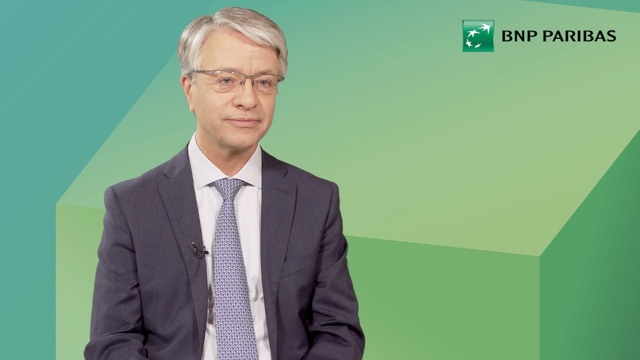EuroBusiness Media (EBM): BNP Paribas, one of Europe’s largest banks, just reported earnings for the third quarter. Baudouin Prot, welcome. You are the CEO of BNP Paribas. To begin, in a few words, how did BNP Paribas perform overall in the third quarter?
Baudouin Prot (BP): BNP Paribas posted €901mn net income last quarter, which is roughly half of the profit generated in the 3rd quarter of 2007. Although this figure may seem low, these earnings were achieved in a quarter which, since September, saw an extraordinary intensification in market turbulences.
BNP Paribas’ net income, close to €1bn, includes a direct impact of the financial crisis of around €1.1bn after tax. Unlike some of our competitors, we have not reclassified any assets from the trading book to the banking book, so these figures show that even if we are certainly not immune from the financial crisis, our earnings generation capacity remains substantial, with €4.4bn net income over the first 9 months of the year.
Beyond the one-offs, this quarter highlights 3 key positive underlying trends for BNP Paribas. First, thanks to our financial solidity, we are gaining customers across the board from retail to corporate and institutional, including both French and non-French clients. Second, we are continuing to finance the real economy with double-digit loan growth in all our retail activities. And third, AMS showed substantial positive net inflows of €7.4bn with a positive contribution from each of its business units.
Certainly, this review of the quarter would not be complete without mentioning the announced acquisition of Fortis Belgium and Fortis Luxembourg. This transaction is important for BNP Paribas again for three reasons. First, it extends our European footprint with market leading positions into two new wealthy countries. Second, it creates the number one deposit base in the Eurozone with over €600bn, close to €600bn, in deposits. And third, last but not least, it very much reinforces our Tier 1 capital base with €16bn with no dilution effect.
We are really happy to welcome the Fortis staff and customers to the BNP Paribas Group and to extend to them the safety and the opportunities that only a major and very solid financial institution can provide. We are very excited by the challenge of extending our group, more than 2 years after the successful acquisition of BNL in Italy.
EBM: As the economic recession looms, would it be fair to assume that bad debt charges will increase across the entire banking sector? And what will this mean for BNP Paribas’ bad debt charges, considering your exposure to corporate lending and to consumer credit? In particular, the market seems to be worried about your exposure to the Spanish consumer credit market, which is deemed the riskiest in Europe.
BP: BNP Paribas experienced a significant cost of risk this quarter, at €2bn. But the majority, actually €1.2bn, relates to the direct impact of the financial crisis on financial counterparties.
Financial crisis aside, the cost of risk is €800mn, up €450mn compared to the very low level of third quarter of 2007, of last year. The bulk of the increase mainly came from 3 businesses. First, CIB where the increase was €172mn, the cost of risk representing 24 basis points this quarter against net write-backs a year ago. Second is Personal Finance where the increase was €138mn, the cost of risk representing 236 basis points, mainly due to the deterioration of consumer finance in Spain. And third, at BancWest the increase was €69mn, mainly due to home builders and consumer finance.
So yes, consumer finance has started to deteriorate in Europe. This is particularly affecting the UK, Ireland, Eastern Europe and Spain. We are hardly present in the first 3 countries, but we are a player in Spain where the cost of risk rose €50mn this quarter. As for our two main domestic markets, namely France and Italy, representing over two thirds of our Personal Finance outstandings, we see limited deterioration thanks to the lower level of household indebtedness.
More globally, given our rigorous risk policy over the cycle, our business lines are well positioned in terms of credit quality in their respective markets, whether in retail or in CIB. This should allow us to continue to outperform in an economic slowdown.
EBM: Last time there was an economic slowdown in your home market, in France, housing prices were still rising at the time. But this time around, both the economy and housing prices are expected to decline in tandem. Therefore, despite the defensive nature of your French retail banking business, is it fair to think that your outlook and guidance for French Retail will have to be downgraded for 2008 and 2009?
BP: The pace of mortgage growth is generally slowing down in France but mortgage outstandings still grew by 7.7% this quarter at BNP Paribas. The main reason for the slower revenue growth in our French Retail Banking activity this quarter is actually the sharp decline in market-related fees, whereas net interest income and banking fees continued to grow nicely.
So in Europe, while the market and economic environment has definitively become less favourable, France remains the least affected market. On top of that our outperformance in France should give us an additional advantage.This quarter, with flat expenses and low cost of risk, pre-tax income in the French retail grew by 5.5%, a very steady performance.
EBM: And what about BNL – are you lowering your guidance for 2009?
BP: Since the acquisition of BNL that we closed in April 2006, and despite the deterioration of the market environment, we are constantly delivering increased synergy targets. With five full points of positive jaws and a limited rise in cost of risk, BNL again posted a double digit Pre-tax Income growth, 12% year-on-year. And in 2009, we’ll benefit from extra €120mn additional synergies.
EBM: In the current climate, would it be fair to assume that all of your international expansion plans into emerging markets are on hold, including China? Or on the contrary, are you looking to make opportunistic acquisitions in emerging markets today, at a time when you may be able to get in at a discount?
BP: Our expansion into emerging markets has always been prudent and our exposure remains moderate. We never wanted to either increase the risk profile of the group, or allocate any significant goodwill in countries that remain subject to potential instability. This quarter, as these countries remain relatively untouched by the financial crisis, our franchises in emerging markets have continued to perform well, with revenues growing 42% and pre-tax income 22% yoy. However, we are monitoring risks in these countries very closely, and in terms of potential acquisitions, you should expect BNP Paribas to apply the same discipline going forward.
EBM: What about asset management? What is your guidance for this business, both in France and outside France?
BP: AMS is positively contributing €134mn this quarter to the group’s pre-tax income, after one-off losses related to Lehman and the Icelandic banks totalling a heafty €200mn. Obviously, the drop in stock markets, fewer retail transactions and the switch to money market funds is weighing on the profitability. However, what is very positive is that €7.4bn of net inflows achieved in this quarter when others have posted significant outflows. And for AMS especially, the acquisition of Fortis will represent a major boost. Private Banking will become number one in the Eurozone with over €200bn in assets. Life insurance will be number one in Belgium. And all together Asset Management will rank top 5 in Europe with assets rising very significantly from €350bn to €550bn.
EBM: It’s true that your Corporate and Investment Banking franchise seems to be one of the most resilient in the sector but, in the current climate, do you still think you need to be allocating so much of your capital to CIB activities, which typically have high volatility and uncontrolled risk?
BP: Yes, BNP Paribas CIB has been clearly one of the most resilient CIBs for 5 consecutive quarters, since the beginning of the financial crisis. Our client-driven business model is delivering lower earnings volatility throughout the cycle, as shown by the very decent 12% pre-tax ROE posted in the first 9 months of 2008.
At BNP Paribas CIB, risks are certainly not uncontrolled. Running a large CIB platform involves significant risk taking, we are definitively not avoiding risk, but we are certainly very risk-aware. Hence, we are continuously investing in our risk processes and, even more importantly, in people, to make sure that we understand at all time our risks and act on them proactively.
So given our track record and the growing attractiveness of our CIB platform, we do not intend to scale it down. We will certainly right size the costs and remain demanding on the returns on allocated capital.
EBM: Everyone knows that BNP Paribas is an important player in equity derivatives, which has the market somewhat concerned today, at a time of very strong market volatility. Therefore, could you update us in real-time and confirm that, during this past month of October – that is after the closing of the third quarter accounts that you reported today – you suffered no major losses due to extremely volatile markets?
BP: Clearly, the extreme turbulence experienced in September has continued and even worsened in October, affecting financial counterparties and creating very erratic market conditions. These extreme conditions lead exceptionally to a slightly negative revenue figure for CIB in October. Despite this, the diversified business mix, the reinforced brand attractivity as well as leadership positions in businesses less affected by the financial crisis, will continue to provide good resilience relative to our peers.
EBM: How do you see the Fortis integration process, both in terms of timetable and main challenges to overcome?
BP: Subject to the necessary approvals, the integration will basically proceed in two stages. Firstly, once the valuing auditor’s report has been approved by the board, BNP Paribas will acquire 54% of Fortis Bank Belgium paid in new shares, actually 88 million shares. And at the same time 100% of Fortis Insurance Belgium will be acquired and paid for in cash. This first stage will give us the control and, hence, lead to the first consolidation of Fortis.
Then, once approval from BNP Paribas shareholders has been obtained via an extraordinary general meeting, the remaining 21% of Fortis bank Belgium as well as 16% of Fortis bank Luxembourg will be acquired and paid for in new shares, with 45 million shares.
Let me add that the initial feedback from Fortis staff and customers, as well as from Belgian and Luxembourg authorities, is very positive. This is certainly a good starting point, and we are definitely committed to making the Fortis integration a great success.
EBM: Won’t the Fortis acquisition, at least in the short-term, erode your capital positions?
BP: Far from it. Actually, the opposite is true. This transaction will actually bolster our capital base once completed. The transaction does not comprise any goodwill, it creates €6bn of minority interests and €9bn of new capital at a price of €68 per share. So overall, the Fortis transaction brings us €16bn of additional Tier 1 capital, which translates into an increase of the Group’s Tier 1 ratio of around 35 basis points. So this transaction not only significantly reinforces BNP Paribas’ pan-European footprint, but it very much also reinforces our financial strength. So we keep our flexibility to finance organic growth and possibly some add-on acquisitions, although clearly you should not expect any major move from BNP Paribas as the Fortis integration will keep us busy for a while.
EBM: We’ve seen some of your peers – for example, UBS, Credit Suisse, and KBC– recently increase their Tier One ratios. Can BNP Paribas spare itself an increase of its Tier 1 ratio?
BP: I really think that we all understand why some banks have had to recapitalise. The extent of their losses and their remaining exposures require these buffers. We do not need the same cushion against potential losses. BNP Paribas’ 7.6% Tier 1 ratio given its prudent risk profile warrants one of the best credit ratings, and the lowest CDS spread within the industry. BNP Paribas does not need to raise its target Tier 1 ratio, as clearly confirmed very recently by the regulator. Without any capital increase, nor dilution for shareholders, BNP Paribas’ Tier 1 capital has risen by €3.5bn since the beginning of the year to €40bn thanks to retained earnings and hybrid capital issues.
Beyond this capital generation we have seized recently two opportunities to increase our capital base. Firstly, the Fortis deal that will generate a total €16bn of extra Tier 1 capital. And secondly, the BNP Paribas’ decision to participate in the French plan with €2.55bn in hybrid Tier 1. Effectively putting this extra capital to work will allow us to continue to post a ROE above our cost of capital and create value for our shareholders. I’m convinced that pilling up capital above the adequate level for each bank will be detrimental to shareholders’ best interests.
EBM: Lastly, in the current difficult environment, will BNP Paribas still be able to pay a dividend to shareholders this year?
BP: Let me first remind you that over 9 months this year our net income group share is €4.4bn, so we are certainly clearly among the banks able to pay a dividend. At this stage our Tier 1 capital is calculated based on the assumption of a 40% pay out ratio, which is exactly the same as last year. As you know, the 2008 dividend will be decided by the board in February, and then submitted to the AGM for approval.
EBM: Baudouin Prot, CEO of BNP Paribas, thank you very much.
BP: You’re welcome.






